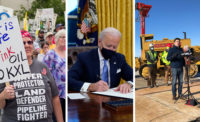After House approval on Aug. 4 of a sweeping energy package, the next step will be reconciling it with the bill the Senate passed in June. Both bills emphasize energy efficiency and promote renewable sources. But other key differences may mean a contentious House–Senate conference after the August break. Andrew Goldberg, the American Institute of Architects' senior director for federal affairs, says, "It's going to be tough. There are a lot of issues that need to be worked out."
Environmental groups hail the House bill as an important step toward a "greener" future. But Energy Secretary Samuel Bodman says the bill will increase U.S. dependence on imported oil and adds that administration officials would recommend a presidential veto.
|
Both bills would require new federal buildings to cut consumption of fossil fuels in stages so that they would be "carbon–neutral" by 2030. The House bill would extend the carbon requirement to federal buildings undergoing major renovations.
The House measure also would require private utilities to provide at least 15% of their electricity from renewable sources such as wind and solar power by 2020. The Senate version has no such provision. But Sen. Jeff Bingaman (D–N.M.), the expected conference committee chair, backs a renewables standard.
The Senate bill would raise the Corporate Average Fuel Economy standard for motor vehicles from 25 mpg to 35 mpg by 2020. The House bill has no CAFE provision. Environmentalists hope a CAFE hike will be in the final version. But House Energy and Commerce Committee Chairman John Dingell (D–Mich.), an auto industry ally and likely conferee, may be a formidable opponent.
The House bill has $16 billion in new or extended tax breaks, mostly for energy efficiency or renewables. To offset the incentives, it trims tax benefits for the oil and gas industries. The Senate version has no tax title.
Karen Wayland, Natural Resources Defense Council's legislative director, says that even if some of the contentious provisions are stripped, the House measure is still a "step in the right direction. There is a lot to like in this bill."
 Includes a renewable standard that would require private utilities to provide at least 15% of their electricity from renewable sources such as wind and solar power by 2020.
Includes a renewable standard that would require private utilities to provide at least 15% of their electricity from renewable sources such as wind and solar power by 2020.

Post a comment to this article
Report Abusive Comment